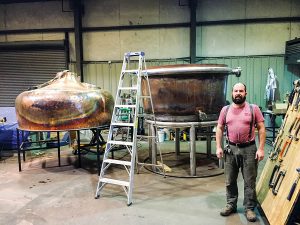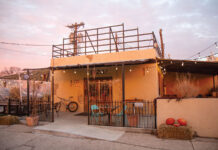
Chip Tate has never been a man of singular focus.
Case in point: He earned his B. A. from William and Mary, and then a Master of Divinity degree from Union Theological Seminary in Virginia. But then, one class shy of a master’s in education, he refused to proceed, because it was “a stupid class,” as he puts it.
This fluidity of mind has brought to Chip Tate’s life no small amount of uncertainty. By his account, subsequent years found him living in “parallel universes for a while… [between] money and what I loved to do.” Rootless, he kept searching for a way to combine those universes. He worked as a cook, and then a brewer… and then, his realization: He loved fermentation.
Chip Tate initially imagined opening a brewery… until whiskey won his heart. While studying for the Institute of Brewing exam, looking at the syllabus for the distilling class, a whisky-scented notion began to ferment. He passed the exam; but a string of mundane jobs unrelated to his newfound passion—assistant dean at a university, owner of a tech startup—led to a crossroad. Tate says he realized he could either work with, or without, zeal for a job.
It was time to pursue his love of distillation.
He fired all his clients and started to work on his “pursuit of passion.” He purchased a building in Waco, TX, and then there was no turning back.
But first, before firing up his new operation in earnest, Tate headed to Scotland for a few weeks of intensive training at the Bruichladdich Distillery Academy. There, while learning the nuances of single-malt distillation, Tate came to visualize his own unique approach to the art and craft. Building a distillery was no longer an option, but a calling.
Upon his return, life savings in hand, Tate set out to follow his passion.
It’s here where Tate’s multivariate fields of interest and experience again come to bear: Unwilling to spend the $200,000 on a commercial still, he took up hammer and torch himself and built his distillery by hand. Visually the result was pure steampunk, as if ripped from the pages of a Jules Verne novel. This is how Balcones Distilling was born.
The word was out. Awards were won… Tate was named an “Icon of Whisky,” and Balcones’ renown grew. And with the newfound demand, the operation required increasing production volume, which called for more stills. Which set the stage for the drama that would ensue.
A battle for control of the business escalated publicly. Tate’s clashes with his investors were splashed in headlines across the country. It started in Waco, spreading all the way to the New York Times, ultimately resonating throughout the Internet.
The media has portrayed Tate as a hot-tempered, threatening, unreasonable distiller. Tate says, “If I could have gotten that kind of press in high school, I probably would have dated a lot more.” He adds sarcastically, “I’m a dangerous man, a badass.”
In the months following the legal kerfuffle, Tate kept mostly to himself and let his lawyers do the talking. He ultimately claimed justice was served, in his favor, and contemplated resuming his role as manager and distiller in the company he created. He realized though he was no longer comfortable as a board member and stockholder. A split was a better option, he decided. Heartbroken, he took a buyout. He bid adieu to Balcones.
TO TATE AND BEYOND!
Tate & Company Distillery is the next incarnation of Tate’s dream: A new crew, a better facility and more capacity all offer opportunity for growth. With a stable financial foundation (thanks to the Balcones buyout, dollar amounts being covered by a non-disclosure agreement), along with a bounty of hard-won wisdom, forward motion is easier than looking back. Having a solid reputation and a network of supporters in the spirits industry also helps.
Still in Waco, Tate & Co. occupies 11,000 square feet with an option for 25,000 more. And again, Tate is not a man of one mind. Along with the distillery, he simultaneously launched Tate Craft Copperworks. After handcrafting his first still at Balcones, he worked with friend Richard Forsyth to design a still for Balcones, which was only installed after his departure. And with a two-year wait for another Forsyths still, Tate realized he again had to make his own way.
Tate Craft Copperworks gives Tate the freedom to create stills as needed. And along with being able to make stills for Tate & Co., he plans to collaborate with other distilleries to forge a copper community.
Tate’s vision for Tate & Co. Distillery is to build a global, sustainable craft distillery, which he describes as being “able to be anywhere, while not being everywhere…” And when it comes to terroir, he says, “That doesn’t mean Bordeaux is only being drunk in Bordeaux. There is an interaction between the place and the people who live there over time that essentially make up what a place is.”
Within the distillery, Tate wants to create a space where people can work, be happy and be comfortable in their lives. As of this writing, the crew at Tate & Co. are “hammering and welding and rolling and hammering and heating and welding and planning.” He expects to release a spirit in the summer of 2016, but much remains to be accomplished.
Tate’s next spirit-related ambition is brandy. After the Balcones drama was at last behind him, Tate took his family and staff to France, a trip that in part included a research mission into the world of brandy. He returned home to Texas ready to distill seasonal, local ingredients with newfound insight. Starting with a small crew, he plans to add staff when production begins, and… yes, there will likely be investors.
But this time around, he will proceed with added caution. He says there will be “a careful distinction between the performers and the audience, even though they all have an important role… [they are] different roles.”
As he shakes the ashes off his feathers and rises again, the future shines bright for Chip Tate. Many in the craft spirits community are eager to taste his next expressions. And although Tate acknowledges that, for him, brown spirits are still the future of craft spirits, he leaves us guessing, for now, what his coming portfolio will look like. z
We must survive our own infancy as craft distillers. —Chip Tate








